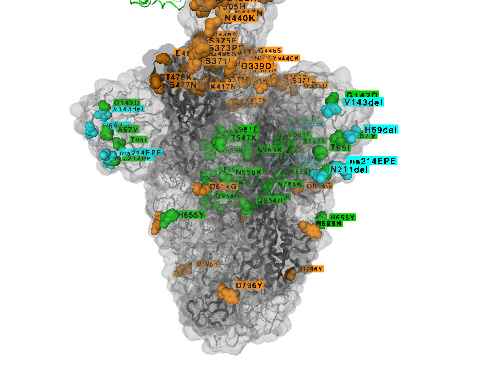Omicron Vaccine Update- After three doses, serum antibodies produced by the Pfizer-BioNTech COVID-19 Vaccine (BNT162b2) neutralise the SARS-CoV-2 Omicron form, according to preliminary results released by Pfizer Inc. and BioNTech SE. One month after receiving the booster immunisation (third dose of BNT162b2 vaccine), serum neutralised the Omicron variant to levels comparable to those seen after two doses of the wild-type SARS-CoV-2 spike protein.

According to preliminary laboratory findings, three doses of the Pfizer-BioNTech COVID-19 Vaccine neutralise the Omicron variation (B.1.1.529 lineage), but two doses had much lower neutralisation titers.
According to the data, a third dose of BNT162b2 increases neutralising antibody titers by 25-fold when compared to two doses against the Omicron variant; titers after the booster dose are comparable to titers seen after two doses against the wild-type virus, which are linked to high levels of protection.
As 80% of epitopes in the spike protein recognised by CD8+ T cells are not affected by the mutations in the Omicron variant, two doses may still induce protection against severe disease
When compared to wild-type, serum from people who received two doses of the current COVID-19 vaccine showed more than a 25-fold reduction in neutralisation titers against the Omicron variant, indicating that two doses of BNT162b2 may not be enough to protect against infection with the Omicron variant. However, because the mutations in Omicron have no effect on the vast majority of epitopes targeted by vaccine-induced T cells.
The companies believe that vaccinated individuals may still be protected against severe forms of the disease. They are closely monitoring real-world effectiveness against Omicron around the world.
A third dose could provide more strong protection, according to results from the firms’ additional tests, which show that a booster with the current COVID-19 vaccine from Pfizer and BioNTech increases antibody titers by 25-fold. According to preliminary data from the firms, a third dose produces neutralising antibodies against Omicron at the same level as two doses against wild-type and other variations that appeared before Omicron.
Antibody levels this high are linked to great efficacy against both the wild-type and mutant viruses. A third dose significantly raises CD8+ T cell numbers against numerous spike protein epitopes, which are thought to be linked to disease protection. The great majority of these epitopes are unchanged in the Omicron spike variation compared to the wild-type virus.
Although two doses of the vaccination may still provide protection against severe infection caused by the Omicron strain, preliminary research suggests that a third dosage of this vaccine improves protection. According to Firm prevent the spread of COVID-19, the best course of action is to ensure that as many people as possible are fully vaccinated with the first two dose series and a booster.
HOW IS THE VACCINE GIVEN?
The vaccine will be given as an injection into the muscle.
Primary Series
The vaccination is given in a two-dose series, three weeks apart, to anyone over the age of five. Individuals 12 years of age and older who are determined to have specific types of immunocompromised may get a third primary series dosage at least 4 weeks following the second dose.
Booster Dose
- A single booster dose of the vaccine may be administered at least 6 months after completion of a primary series to individuals 18 years of age and older
- A single booster dose of the vaccine may be administered to individuals 18 years of age and older who have completed primary vaccination with a different authorised COVID-19 vaccine. Individuals should check with their healthcare provider regarding timing of the booster dose
Emergency Use Authorization (EUA Statement)
Emergency uses of the vaccine have not been approved or licensed by FDA, but have been authorised by FDA, under an Emergency Use Authorization (EUA) to prevent Coronavirus Disease 2019 (COVID-19) in individuals 5 years of age and older. The emergency uses are only authorised for the duration of the declaration that circumstances exist justifying the authorization of emergency use of the medical product under Section 564(b)(1) of the FD&C Act unless the declaration is terminated or authorization revoked sooner. (EUA Fact Sheets)
IMPORTANT SAFETY INFORMATION
If you have any of the following conditions, you should not obtain the vaccine a) severe allergic reaction to any of the vaccine’s ingredients b) severe allergic reaction to a previous dose of this vaccination.
Individuals should disclose all medical conditions to the vaccination provider, including if they: Allergies, Fever, Myocarditis, Pericarditis, Fever, Bleeding Disorders, On Blood thiner medications, pregnant, plan to become pregnant, or breastfeeding, received another COVID-19 vaccine, ever fainted in association with an injection.
Adverse Reactions
The vaccine has a small probability of causing a serious allergic reaction.
A significant allergic reaction would likely happen within minutes to an hour of receiving a vaccination dose. As a result, vaccination providers may advise people to stay at the location where they received the vaccine thereafter for monitoring.
Difficulty breathing, swelling of the face and throat, a fast heartbeat, a nasty rash all over the body, dizziness, and weakness are all signs of a severe allergic reaction.
If someone has a severe allergic response, they should visit nearest emergency room.
Myocarditis (inflammation of the heart muscle) and pericarditis (inflammation of the lining outside the heart) have occurred in some people who have received the vaccine. Symptoms appeared in the majority of the persons Age under 40yrs, within a few days of receiving the second dosage of the vaccine. The chances of this happening are extremely low. If somebody experiences any of the following symptoms after taking the vaccine, they should seek medical help right away
Chest Pain, Shortness of Breath, Fast Beating, Fluttering, Pounding of heart
Additional side effects that have been reported with the vaccine include: Severe allergic reactions, non-severe allergic reactions such as rash, itching, hives, or swelling of the face, myocarditis, pericarditis, injection site pain, tiredness, headache, muscle pain, chills, joint pain, fever, injection site swelling, injection site redness.
Source: PIFZER, WHO, CDC- Omicron

